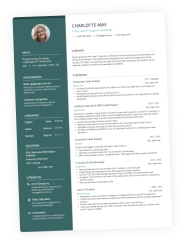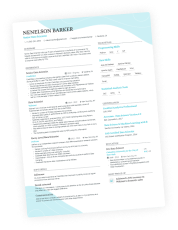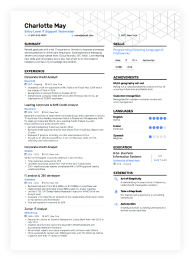Having the right skills is crucial in the modern job market. Continually developing industry-specific skills ensures employability in a competitive field.
IT skills are essential in the tech industry. Technology rapidly evolves, so it’s important to stay relevant by keeping your skills sharp.
There are various industries under the tech umbrella. We will explore the most important skills in each industry and provide tips on how to showcase them on your CV.
Read this article to learn how to enhance your CV with relevant IT skills and get one step closer to being shortlisted.
Identify the best IT skills for your CV and then head over to our CV builder to start creating your own today.
Upload & Check Your CV
Drop your CV here or choose a file. PDF & DOCX only. Max 2MB file size.
17 basic IT skills for any industry
Kicking off this list are some of the most basic IT skills. Even if you don’t work in a technical role, it’s likely that your job will require at least some of the skills listed below.
Microsoft Office Suite
1. Word
2. Excel
3. PowerPoint
4. Outlook
5. OneNote
6. OneDrive
Basic office tools are the bedrock of any office job. Perhaps the most popular of all is Microsoft Office Suite.
Love it or hate it, the tools listed above will likely be a requirement for your role. Even outside the IT industry, most companies expect their employees to be familiar with Microsoft Office.
The level of proficiency will vary on your industry, level, and role.
If your job requires very little office work, basic knowledge of Word will suffice. If your job involves analysing data or keeping track of numbers, expertise in Excel is necessary.
Even if the job description doesn’t explicitly state Microsoft Office Suite as a required skill, it’s a good idea to develop at least a basic proficiency.
Microsoft Office tools have become such a standard in most industries that many employers won’t even list them as requirements, they will just expect all candidates to know them.
If you’re a stranger to Microsoft Office Suite, consider developing your skills with an online course.
Email and communication tools
1. Gmail
2. Slack
3. Microsoft Teams
4. Google Hangouts
5. Asana
6. Trello
7. Skype
8. Zoom
Email and communication tools are another basic standard across industries. It’s difficult to think of an industry that doesn’t require any email communication at all.
Gmail and other email hosting providers are the most common form of internal and external communication. Depending on your industry and company culture, there may also be an internal communication tool.
Tools like Slack and Microsoft Teams facilitate quick and easy communication between colleagues. These are especially popular for jobs done remotely or when team members are in different locations.
Email and communication tools are another skill group that most companies will expect at least basic knowledge of. If you are completely unfamiliar, consider researching the most common ones in your industry and taking an online course.
Operating systems
1. Windows
2. macOS
3. Linux
If your job requires any use of a computer at all, then it requires knowledge of an operating system. Here is where the most common choice starts to divide among industries.
Windows is common in the corporate world and is often used for administrative roles. Engineers, developers, and data entry jobs also commonly use Windows.
MacOS is popular in creative industries and is used for roles like graphic design and editing.
Linux is an open source operating system, making it a popular choice among developers and engineers.
That is a general overview, but the specific operating system used for a particular job varies from company to company. It’s best to research which operating system is the most common in your field and at the companies you’re applying to work for.
There are many ways you can format your CV to showcase basic IT skills, but let’s take a look at an example of the experience section.
- •Analyzed sales using Excel to identify trends and create marketing strategy, increased revenue by 42%
- •Communicated with retail staff and sales representatives using Slack
- •Reformatted marketing reports for compatibility during companywide transition from macOS to Windows
By incorporating basic IT skills into your experience section, you’re showing how you applied your skills in previous roles.
Potential employers will be able to see how you will impact success at their company.
14 essential programming and web development skills for your CV
For programmers and developers, it goes without saying that programming skills are a must. But which ones are the best to focus on?
Programming languages
1. Python
2. Java
3. JavaScript
4. C++
5. R
6. SQL
7. Kotlin
8. PHP
Not all IT jobs require programming languages. For coders, developers, engineers, and programmers, they are a must.
For some roles, programming language knowledge is helpful but not always required. These jobs include UX/UI design, SEO specialist, and system administrator.
There are a ton of coding languages floating around the tech stratosphere these days. It can be overwhelming to determine which are the right ones to learn.
The programming languages listed above are currently some of the most in-demand skills in the industry.
If you’re lacking knowledge in a particular language or just want to develop your skills further, there are a number of resources for courses and training.
8 online platforms when you can learn IT skills
- Coursera
- Udemy
- Skillshare
- Udacity
- Codecademy
- FutureLearn
- edX
- Pluralsight
Web development
1. HTML/CSS
2. JavaScript and jQuery
3. Responsive design
4. Content management systems (CMS)
5. React
6. Node JS
If your role is in website design, be sure to make your web development skills shine on your CV.
For jobs in application development, front-end/back-end development, and web content managers, proficiency in the above skills are necessary.
Level of proficiency matters when adding technical skills like these to your CV. Anyone can list “HTML” in their skills section. You need to show hiring managers your expertise.
How can you make yourself stand out from all the other qualified candidates?
Let’s look at an example below.
The candidate in the example above selected their best programming and development skills to highlight on their CV.
Each skill is backed up with a specific example of application and success.
Don’t just expect companies to take your word for it. Show exactly how you’ve achieved results with your IT skills and always tailor your CV to your target job.
8 key networking and cybersecurity skills in 2025
Networking and cybersecurity is an important aspect of IT and helps to protect data from potential risks. Enhance your CV by showcasing your expertise in these niche skills.
Networking fundamentals
1. LAN/WAN
2. TCP/IP
3. VPNs
4. Cisco
Network specialists and computer networking architects have expertise in networking fundamentals.
While it is possible to work in networking without a formal education, most jobs will require a degree or specialized certification.
Some companies may require vendor-specific certification, meaning certification for the specific organization you will be working for.
There are also vendor-neutral certifications which are often prerequisites for vendor-specific certifications.
Top 3 vendor-neutral certifications for network engineers in 2025
- CompTIA A+
- CompTIA Network+
- CompTIA Security+
Remember to highlight your certifications on your CV so potential employers know immediately that you’re qualified to do the job.
Cybersecurity basics
1. Firewalls
2. Encryption
3. Penetration testing
4. Risk assessment
Cybersecurity is an area of IT that requires highly skilled professionals. You are dealing with sensitive information and protecting companies from serious risks.
There are a number of jobs to consider in cybersecurity, all with their own set of qualified skills. Cybersecurity engineer, malware analyst, information security specialist, and chief information security officer are all paths to consider.
Like networking, cybersecurity has a number of certifications where you can acquire unique skills.
5 key certification programs for cybersecurity in the UK
- Certified Information System Security Professional (CISSP)
- Certified SOC Analyst (CSA)
- CompTIA Cybersecurity Analyst (CySA+)
- Certified Network Defender (CND)
- The Cyber Threat to UK Business
Let’s look at an example of how to showcase IT certifications on your CV.
The certifications section of your CV is simple but important. You only need to include the name of the certificate and the issuing organization.
Be sure to highlight important certifications on your CV to increase your chances of getting shortlisted.
12 data management and analysis skills to enhance your CV
Collecting, managing, and analysing data is important for a company to be able to make informed business decisions.
Enhance your CV by adding IT skills in data management and analysis.
Database management systems
1. SQL
2. Oracle
3. MongoDB
4. Amazon SimpleDB
5. IBM DB2
6. MS Access
7. SAP HANA
8. Teradata
A strong working knowledge of database management systems is necessary for database administrators.
The specific database management system varies depending on the industry and company. Research trends in your industry and target companies to decide which you should focus on.
It is a good idea to maintain proficiency and continually learn database management systems as they become popular. Staying relevant in the industry enhances employability.
Data analysis tools
1. Microsoft Excel
2. Python (Pandas, NumPy)
3. R
4. Tableau
Data analysts analyse data for a company and present solutions, trends, and other important information. Proficiency in the right data analysis tools is a must for the job.
Like other essential IT skills on your CV, be sure to quantify your knowledge with specific examples, achievements, or certifications.
Let’s look at how to show data management and analysis skills in the summary section of your CV.
The candidate in the example above shows how they used specific data analysis tools to achieve measurable results.
9 cloud computing and virtualisation skills for your CV in 2025
Cloud computing and virtualisation is a growing industry in the tech sector. Leverage your skills to increase your chances of getting shortlisted in this growing market.
Cloud platforms
1. Amazon Web Services (AWS)
2. Microsoft Azure
3. Google Cloud Platform (GCP)
4. IBM Bluemix
More and more companies are shifting to cloud-based services, making professionals skilled in cloud platforms in high demand.
There are some jobs with a specific focus on cloud computing, such as cloud computing analyst and cloud engineer. For roles like this, expertise in cloud platforms like the ones listed above is necessary.
However, a wide range of IT professionals can benefit from cloud platform knowledge. Developing skills in cloud platforms is a good way to maintain your value as cloud-based technologies become more common.
Virtualisation technologies
1. VMware
2. Hyper-V
3. Docker
4. D3.js
5. ChartBlocks
Virtualisation technologies are another growing area of the IT sector.
Virtualisation engineers, architects, and specialists perform important functions for a company’s virtual computing platform.
Innovative fields like virtualisation require experts to evolve with the industry to stay relevant. Develop your skills and continually learn technologies like the ones listed above to increase your value.
Let’s take a look at one more example of how to showcase IT skills in a CV projects section.
- •Developed and maintained app using AWS that tracks personal bank activity and spending habits
- •87% of users reported that the app was easy to use and improved their personal finances
Not all CVs will have a project section, but it is a great way to showcase skills and experience outside of your work history.
This candidate highlighted how they used cloud computing skills and achieved measurable success.
Key takeaways for showcasing IT skills on a CV
Highlighting IT skills is key for a strong CV, for careers both in and out of the tech sector.
Select the right IT skills by researching market trends and your target industry. Develop your skills with training or certification courses.
Quantify your IT skills by showing how you’ve achieved measurable success with real examples and certifications.
Enhance your CV and increase your value in the industry by continually learning and updating your IT skills!



